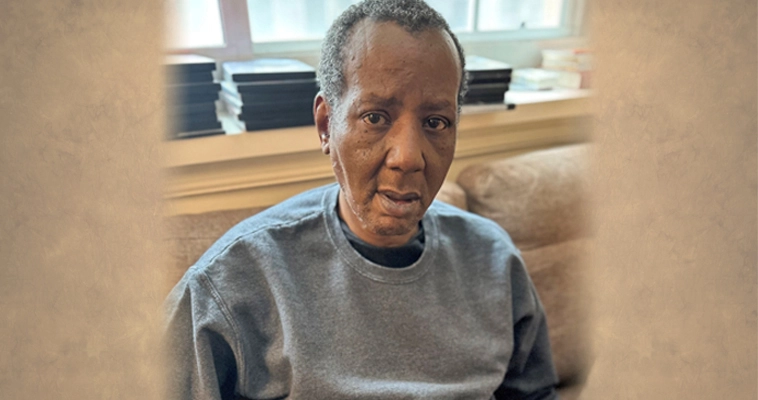Kevin has battled with his mental health since adolescence. Friends started to notice a change in his behavior during his freshman year of college. Despite his strong academic background, the stress of college and a new environment manifested in the form of delusions and hallucinations. Friends and family were very worried, so he was almost relieved to receive a diagnosis of schizophrenia. With this diagnosis, Kevin, his family, and his doctors could begin to come up with a treatment plan. Although the course of his life was altered, Kevin was able to live independently and manage his mental health.
On a shopping trip to Walmart in December 2022, Kevin remembers starting to feel confused about his surroundings and what he was doing. He eventually made his way to checkout where a vigilant cashier picked up on his confusion and unusual behavior and called 911. In the emergency room, doctors determined he was having a stroke. He spent 11 days recovering in the hospital.
After getting better, Kevin hoped to return to his own apartment. But his family quickly realized the apartment was uninhabitable. Although Kevin had been working with doctors to manage his mental health symptoms, he had trouble managing his housing, had begun hoarding items and trash, and attracted insects including bed bugs. Because of the bed bugs, nothing from the apartment was recoverable, and he had no choice but to move into to a nursing home while his family tried to figure out what to do next.
Kevin had a good experience at the nursing home where he lived. He liked the staff, the food, and activities. He enjoyed having help when he needed it and having his meals prepared. His family realized that Kevin was independent enough to do things on his own, but needed some oversight to make sure household tasks like cleaning and laundry were completed. Kevin and his family wanted him to live in a more independent setting where he could still have a room and space to himself.
A social worker at the facility introduced Kevin’s family to Money Follows the Person (MFP) program. They began working with a specialized care manager and transition coordinator to identify the services and living situation that would best suit Kevin’s needs. He was a perfect fit for assisted living, where Kevin would have his own apartment but still have access to nurses, meals, cleaning and laundry services. Kevin, his family, and his MFP team identified items Kevin would need in his apartment. With MFP funds, they purchased a full-sized bed, kitchen table and chairs, dishes and silverware, a couch, and other supplies.
June 6th, 2023 was a very exciting day for Kevin and his family. Kevin’s aunt Jonell brought him to his new apartment. His MFP transition coordinator was waiting for him and helped set up his new place. It would take some time for Kevin to adjust, but he was happy to have a place to call his own again.
To help him adjust to his new setting, MFP assigned a community support provider (CSP) to visit Kevin twice a week. His CSP became a good friend, providing Kevin with socialization, encouragement to join group activities, and even taking him out to get haircuts. Kevin has been living in the community again for 7 months. He enjoys attending exercise class, having meals in the communal dining room, and watching movies from his vast collection. Most importantly to Kevin, he can take shopping trips to Walmart and other stores, one of his favorite activities prior to his nursing home stay. He feels happy, safe, and extremely grateful for the way MFP and his family helped him start this new chapter.
Read the CT Money Follows the Person Quarterly Report
MFP Demonstration Background
The Money Follows the Person Rebalancing Demonstration, created by Section 6071 of the Deficit Reduction Act of 2005, supports States’ efforts to “rebalance” their long-term support systems, so that individuals can choose where to live and receive services. One of the major objectives of Money Follows the Person (MFP) is “to increase the use of home and community based, rather than institutional, long-term care services.” MFP supports this by offering grantee States an enhanced Federal Medical Assistance Percentage on qualified services. MFP also offers states the flexibility to provide supplemental services, such as assistive technology and enhanced transition services, to assist in successful transitions. States are then expected to reinvest the savings over the cost of institutional services to rebalance their long-term services and supports for older adults and people with disabilities to a community-based orientation.

